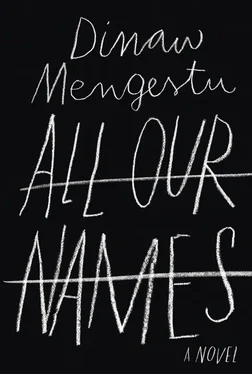He took the guards apart one at a time. He began with their shoes, spitting on each one.
“This isn’t a slum,” he said. He took the scarves off the girls’ heads and gave them to the guards so they could polish their shoes with them. When they were done with their shoes, Isaac pointed to the dirt on their faces. He grabbed the youngest of the guards — a man who was still at least a decade older than him — by his ear. “You must be deaf,” he said. “Look at your ear.” Isaac took the same scarf the man had used to wash his shoes and stuffed it into his ear, and when that wasn’t enough, he began to shine his forehead and cheeks with the scarf.
I watched Isaac’s nervous, irrational rage unfold from the sidelines. I told myself that if he did the same to the girls I’d protest, but he exhausted whatever violence he had in him on those men, and I suspect that I knew he would do so all along, which was why I felt free to set those terms to begin with.
Fortunately, we had night on our side. As soon as the light began to dim, Isaac relaxed. He knew we wouldn’t have to wait much longer; no one wanted to be on the road at night, not even the soldiers who patrolled the streets. If you were far from home at dusk, nothing in the world seemed crueler than a setting sun, especially if it was a stunning one, with thin vestiges of purple and red clouds streaked around it. Beauty at times like that was a reminder of nature’s — or, for the faithful, God’s — indifference. The greater the splendor, the more terrible the absence and terror that came with it. I remember the sun that evening as being more remarkable than most, but only because there were ten of us safely grouped together to admire it. We all felt touched by its grace, to different degrees and for different reasons.
No sooner had the sun vanished than the first traces of a heavy engine and tires crushing gravel could be heard. The guards responsible for opening the gate turned toward it, as if longing to perform the one task they were certain they knew how to accomplish. Isaac stared directly at each of the guards and, by doing so, kept them in place. At the last possible moment, Isaac clapped his hands and set them free. All four scrambled to lift the locks and pull open the gates. In their haste, they trampled the perfect driveway they had spent hours creating. Isaac wasn’t troubled in the least bit, though. I saw him smile as they ruined what he had demanded they create.
“Look at them,” he said. “They’re like children.” But there was no affection behind his words. Though he called them children, I was certain that what he really meant to say was that to him they were like dogs.
The gates opened and three black Mercedes slid into the courtyard. They looked beastly in the semi-darkness of early night, with their pale-yellow parking lights shining over us. I doubt I was the only one who felt an instinctive desire to run. They are only men, I said to myself, but there was no comfort in that. If there was anything to fear in this world, it was men who came in under the cover of night, who sat in expensive cars behind tinted windows, with the engines running and the lights on, while they measured their safety and our value to them.
At least a quarter-hour must have gone by before the first car turned off its engine and the second and third followed. None of us moved or spoke. By now it was dark outside. That’s what they had been waiting for. When the car doors opened, all I could see from my place on the porch were the silver door handles and the outlines of the six men, who exited in pairs from the back of each sedan. Four were wearing dark suits and were as tall and almost as thin as I was. The two who had exited first, from the last car, were short and barrel-chested; their military decorations and caps stood out as clearly as the pistol each was holding at his side.
After all the anxiety and preparations, the men came and disappeared in a matter of minutes. They stood in the courtyard, talking among themselves, and then, without so much as a single glance at the guards, or the grounds, filed into the house. Only one stayed long enough to acknowledge that any of us were there, and even that interaction lasted a matter of seconds. That man was by far the youngest of the four men in suits. He paused at the entrance to shake Isaac’s hand. I knew immediately I had seen his face before.
“You’ve done a fine job,” he said, clasping both his hands around Isaac’s. His voice was familiar; he had a real British accent. He avoided looking directly at me, but I remembered where I had last seen him. He had been sitting at the table across from Isaac and me at the Café Flamingo. He was the one who had ordered the beating to stop. When I walked past the café, alone or with Isaac, I looked to see if he was there. He never was, and so I never mentioned him to Isaac. I wasn’t sure what I would have said had he been. That man there saved you from being beaten to death, or that man there watched for several minutes as those boys nearly beat you to death.
Isaac walked him to the door. One of the soldiers opened and closed it quickly, and then took his place in front, while the other hovered restlessly around the cars. Having decided the house was safe, they slid their guns into their holsters. They made a show of looking professional; they wanted it to be clear that they were officers, not hired guards at the end of their career.
I followed Isaac back to the tree, where we had left the chairs we’d spent most of the afternoon on. It was a warm, slightly humid night. Miles away, near the center of the city, we could see at least a half-dozen bright white lights that had been raised to trap the grasshoppers that had just begin to come out. It was hunting at its simplest: the grasshoppers swarmed around the lights and knocked themselves out by the dozens on the metal sheets that surrounded them. They were collected in barrels and then sold by the handful in little brown bags or plastic sacks, half dead or freshly roasted, a delicacy for even the poorest. It was said the president ate them by the dozens, roasted or boiled and then dipped in chocolate.
Isaac was staring at the lights as well. He had told me once how as a child he had tried to create his own little grasshopper farm to profit from, by taking all the candles from his grandparents’ house and lighting them in the yard. “I caught three grasshoppers,” he said, “and then I almost died of malaria after a hundred mosquito bites.”
“We’re missing out on all the fun,” he said as he pointed toward the lights. He was sincere, and full of nostalgia. I was relieved to hear him talk like that.
“There’s always tomorrow,” I said.
“Second day is not as good,” he said. “You want them on the first night, when they’ve just come out.”
I let him dream about grasshoppers and the riches he might have made off of them. It was one of the rare times in my life when a part of me wasn’t concerned with how many minutes or hours had passed since someone had last spoken. I knew the doors to the house weren’t going to open anytime soon, but more than that, I knew that once they did it would be harder — not impossible, just harder — for both of us, Isaac especially, to drift into the past so easily. I let him have that for as long as I could. Eventually, though, I had to ask him: “What happens now?”
“We wait,” he said. “They have things to discuss inside that don’t concern us.”
“That man,” I said.
“Which one?”
“The one who thanked you.”
“What about him?”
“I’ve seen him before. He was at the café that afternoon.”
“His name is Joseph,” Isaac said. “The Flamingo is his café.”
“Did you know that when we went there?”
Читать дальше












